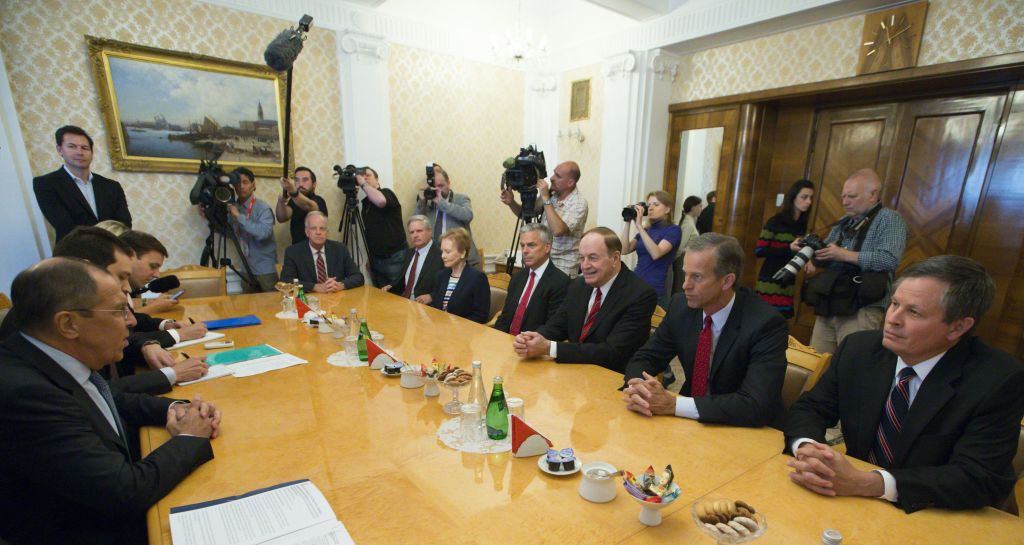Freshly returned from Moscow, GOP Sen. Ron Johnson says the U.S. needs to rethink Russia sanctions


A free daily email with the biggest news stories of the day – and the best features from TheWeek.com
You are now subscribed
Your newsletter sign-up was successful
Sen. Ron Johnson (R-Wis.) came back from his June 30-July 5 trip to Russia with some new perspectives on the sanctions the U.S. imposed on Moscow after its annexation of Crimea and interference in the 2016 presidential election. "We need to take a look at sanctions — are they actually changing Russia's behavior?" he told Sirius XM Washington correspondent Olivier Knox on Friday. "And right now, unfortunately, I don't think they're particularly working from that standpoint."
The eight-Republican delegation to St. Petersburg and Moscow — led by Sen. Richard Shelby (Ala.) and including Johnson, Rep. Kay Granger (Texas) and Sens. Steve Daines (Mont.), John Hoeven (N.D.), John Kennedy (La.), Jerry Moran (Kan.), and John Thune (S.D.) — met with Russian Foreign Minister Sergei Lavrov and Russian lawmakers, though not President Vladimir Putin. "Members of the delegation set off on their trip late last week promising to be tough with Russian officials ahead of the president's visit, especially on matters of election interference," The Washington Post reported. "But they struck a conciliatory tone once there," which "played well in Moscow, but not on the home front."
Johnson told The Washington Examiner that the GOP delegation did hammer the Russians on Moscow's meddling in the 2016 election, but the Russians "would push back with all the ways we interfere in their politics in terms of funding NGOs, and Radio Free Europe and Voice of America," and "nobody yielded." At the same time, he added, "I've been pretty upfront that the election interference — as serious as that was, and unacceptable — is not the greatest threat to our democracy. ... We've blown it way out of proportion." Johnson also said some sanctions did have promise: "My sense is that the targeted sanctions to the oligarchs, to the members of government, are the ones that really sting and probably [offer] the best chance of affecting their behavior."
The Week
Escape your echo chamber. Get the facts behind the news, plus analysis from multiple perspectives.

Sign up for The Week's Free Newsletters
From our morning news briefing to a weekly Good News Newsletter, get the best of The Week delivered directly to your inbox.
From our morning news briefing to a weekly Good News Newsletter, get the best of The Week delivered directly to your inbox.
A free daily email with the biggest news stories of the day – and the best features from TheWeek.com
Peter has worked as a news and culture writer and editor at The Week since the site's launch in 2008. He covers politics, world affairs, religion and cultural currents. His journalism career began as a copy editor at a financial newswire and has included editorial positions at The New York Times Magazine, Facts on File, and Oregon State University.
-
 How the FCC’s ‘equal time’ rule works
How the FCC’s ‘equal time’ rule worksIn the Spotlight The law is at the heart of the Colbert-CBS conflict
-
 What is the endgame in the DHS shutdown?
What is the endgame in the DHS shutdown?Today’s Big Question Democrats want to rein in ICE’s immigration crackdown
-
 ‘Poor time management isn’t just an inconvenience’
‘Poor time management isn’t just an inconvenience’Instant Opinion Opinion, comment and editorials of the day
-
 Witkoff and Kushner tackle Ukraine, Iran in Geneva
Witkoff and Kushner tackle Ukraine, Iran in GenevaSpeed Read Steve Witkoff and Jared Kushner held negotiations aimed at securing a nuclear deal with Iran and an end to Russia’s war in Ukraine
-
 Pentagon spokesperson forced out as DHS’s resigns
Pentagon spokesperson forced out as DHS’s resignsSpeed Read Senior military adviser Col. David Butler was fired by Pete Hegseth and Homeland Security spokesperson Tricia McLaughlin is resigning
-
 Judge orders Washington slavery exhibit restored
Judge orders Washington slavery exhibit restoredSpeed Read The Trump administration took down displays about slavery at the President’s House Site in Philadelphia
-
 Hyatt chair joins growing list of Epstein files losers
Hyatt chair joins growing list of Epstein files losersSpeed Read Thomas Pritzker stepped down as executive chair of the Hyatt Hotels Corporation over his ties with Jeffrey Epstein and Ghislaine Maxwell
-
 Judge blocks Hegseth from punishing Kelly over video
Judge blocks Hegseth from punishing Kelly over videoSpeed Read Defense Secretary Pete Hegseth pushed for the senator to be demoted over a video in which he reminds military officials they should refuse illegal orders
-
 Trump’s EPA kills legal basis for federal climate policy
Trump’s EPA kills legal basis for federal climate policySpeed Read The government’s authority to regulate several planet-warming pollutants has been repealed
-
 House votes to end Trump’s Canada tariffs
House votes to end Trump’s Canada tariffsSpeed Read Six Republicans joined with Democrats to repeal the president’s tariffs
-
 Bondi, Democrats clash over Epstein in hearing
Bondi, Democrats clash over Epstein in hearingSpeed Read Attorney General Pam Bondi ignored survivors of convicted sex offender Jeffrey Epstein and demanded that Democrats apologize to Trump
